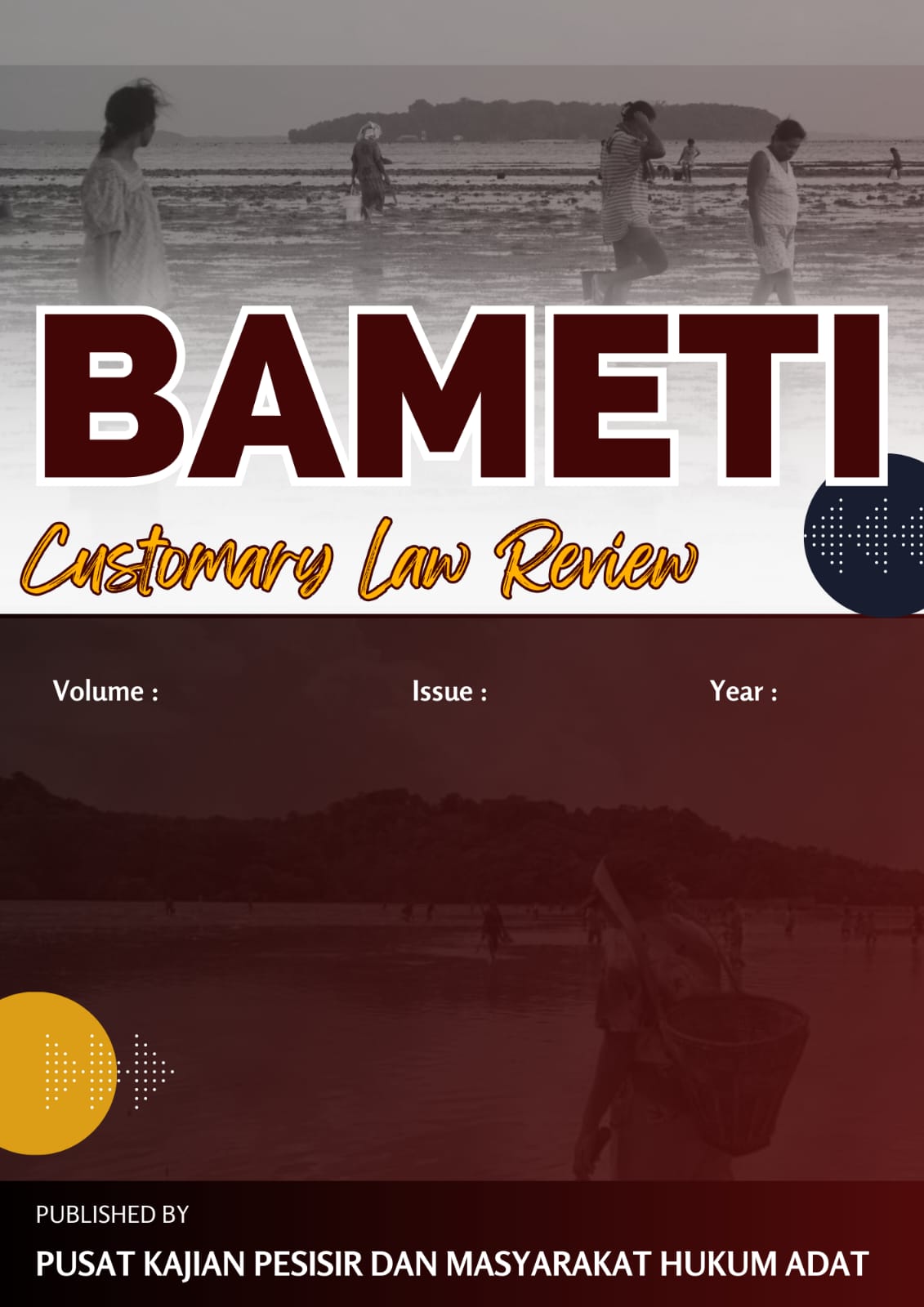Hak Milik Di Atas Tanah Hak Ulayat Negeri Halong
Abstract
This research discusses the Juridical Analysis of Property on Negen Halong Customary Land (Case Study of Supreme Court Cassation Decision Number 2879 K/Pdt/2019) which is the disputed land. This study aims to further discuss the juridical ownership rights over the customary land of Negen Halong. This research uses the juridical normative method by using a statutory approach, a conceptual approach, and a case approach. The results of the research show that the Supreme Court Judge’s Consideration in the Cassation Decision Number 2879 K/Pdt/2019) considers that against these reasons the Supreme Court is of the opinion that the reasons for cassation cannot be justified, due to legal consideration and the decision of the judex facti/Ambon High Court which annulled the decision of the Ambon District Court was correct and correct and not wrong in applying the law. Dictum of the Supreme Court Decision in Decision Number 2879 K/Pdt/2019 that after this final decision was notified to the applicant for cassation on 15 February 2019, then the petition for cassation was filed against him on 27 February 2019, as it turns out from the Deed of Request for cassation Number 6K/Pdt.G/2019/PN.Amb made by the Registrar of the Ambon District Court, the application was followed by a cassation memory containing the reasons received at the Registrar’s office of the District Court on March 6 2019.
Downloads
References
Andi Hamzah, KUHP dan KUHAP, Jakarta, Rineka Cipta, 1996
Laksanto Utomo, Hukum Adat, Ed.1-Cet.2, Rajawali Pers, Depok, 2017
Lilik Mulyadi, Seraut Wajah Putusan Hakim dalam Hukum Acara Pperdata Indonesia: Perspektif, Teoritis, Praktik, Teknik Membuat Dan Permasalannya, Citra Aditya Bakti, Bandung, 2015.
M Natsir Asnawi, Hukum Pembuktian Perkara Perdata di Indonesia: Kajian Konstektual Mengenai Sistem Asasi, Prinsip, Pembebanan, UII Pressi, Yogyakarta, 2013.
Mukti Arto, Praktek Perkara Perdata pada Pengadilan Agama, cet V, Yogyakarta, Pustaka Pelajar, 2004.
M. Yahya Harahap. Pembahasan Permasalahan dan Penerapan KUHAP: Penyidikan dan Penuntutan, Sinar Grafika, Jakarta, 2003.
Permukaan bumi memberikan suatu interprestasi autentik tentang apa yang diartikan oleh pembuat UUPA dengan istilah “tanah”, lihat Sudargo Gautama, Tafsiran Undang-Undang Pokok-Pokok Agraria (1960) dan Peraturan-Peraturan Pelaksanaannya (1996), cet kesepuluh, Citra Aditya Bakti, 1997, Bandung.
Purnandi Purbacaraka dan Ridwan Halim, Sendi-sendi HukumAgraria, Penerbit Ghalia Indonesia, Jakarta, 1993.
Ronald Saija, Status Kepemilikan Hak Atas Tanah Adat Marga dalam Kebijakan Penataan Aset Reforma Agraria Di Kabupaten Maluku Tenggara, SASI Volume 26 Nomor 1, Januari-Maret 2020: h. 99-110, p-ISSN: 1693-0061/ e-ISSN: 2614-2961, Jurnal Terakreditasi Nasional, SK. No. 28/E/KPT/2019.
Soerjono Soekanto, Hukum Adat Indonesia, Jakarta: Rajawali Pers, 2008.
Supriadi, Hukum Agraria cet-9, Jakarta: Sinar Grafika, 2019.
Syamsul Rizal, Kebijaksanaan Agraria Sebelum dan Sesudah Keluarnya UUPA, Fakultas Hukum Bagian Perdata Universitas Sumatra Utara, Medan, 2003.
Copyright (c) 2023 Yuniar Sachmad, Ronald Saija, Sabri Fataruba

This work is licensed under a Creative Commons Attribution-NonCommercial 4.0 International License.
Authors who publish their manuscripts in this Journal agree to the following conditions:
- The copyright in each article belongs to the author, as well as the right to patent.
- Authors are able to enter into separate, additional contractual arrangements for the non-exclusive distribution of the journal's published version of the work (e.g., post it to an institutional repository or publish it in a book), with an acknowledgment of its initial publication in this journal.
- Authors are permitted and encouraged to post their work online (e.g., in institutional repositories or on their website) prior to and during the submission process, as it can lead to productive exchanges, as well as earlier and greater citation of published work.
- Authors have the right to self-archiving of the article (Author Self-Archiving Policy)













